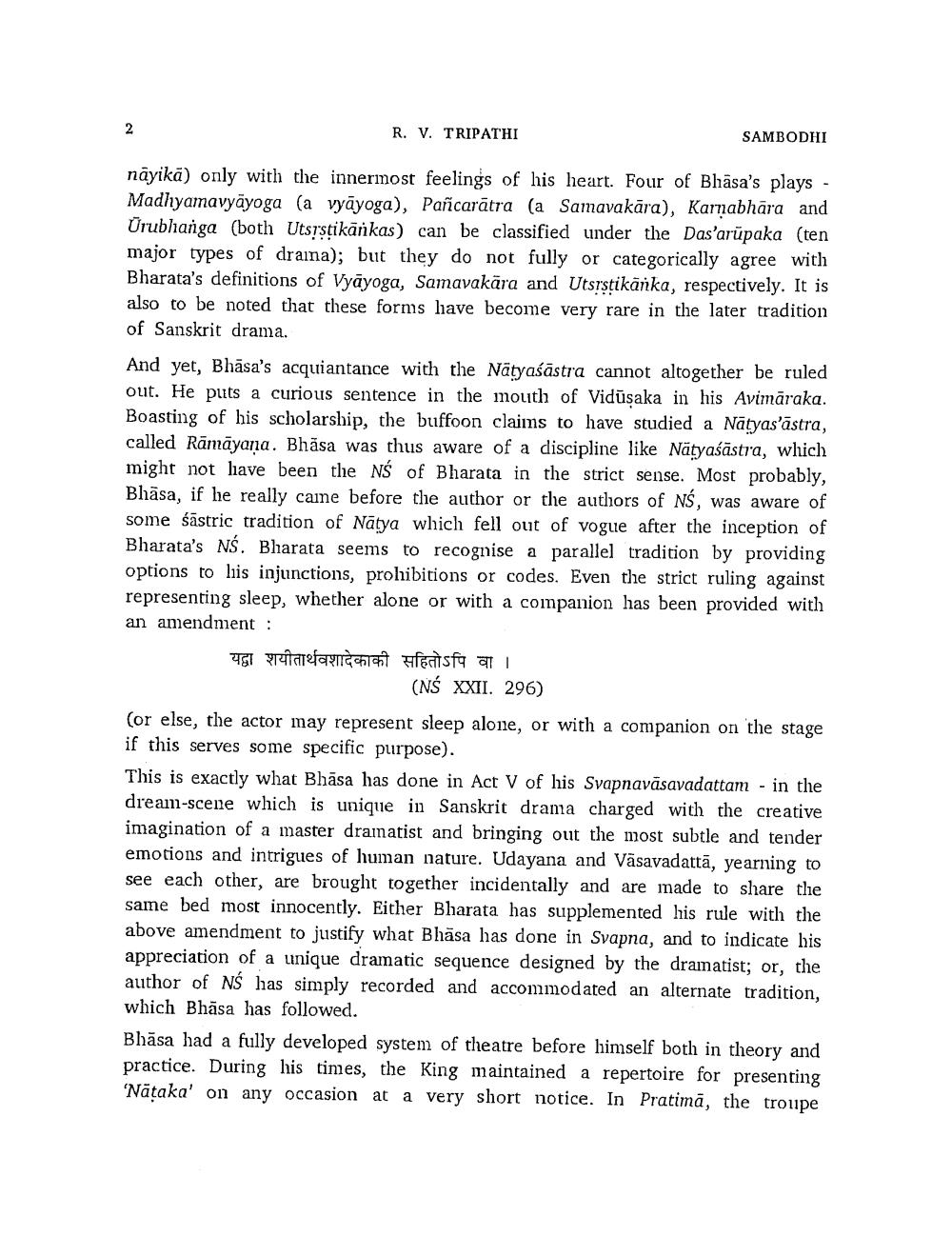Book Title: Sambodhi 1996 Vol 20 Author(s): Jitendra B Shah, N M Kansara Publisher: L D Indology Ahmedabad View full book textPage 6
________________ R. V. TRIPATHI SAMBODHI näyikā) only with the innermost feelings of his heart. Four of Bhāsa's plays - Madhyamavyāyoga (a vyāyoga), Pañcarātra (a Samavakāra), Karnabhāra and Ürubhanga (both Uts?stikānkas) can be classified under the Das’arūpaka (ten major types of draina); but they do not fully or categorically agree with Bharata's definitions of Vyāyoga, Samavakāra and Utsrstikānka, respectively. It is also to be noted that these forms liave become very rare in the later tradition of Sanskrit drama. And yet, Bhäsa's acquiantance with the Nātyaśāstra cannot altogether be ruled out. He puts a curious sentence in the mouth of Vidūşaka in his Avimāraka. Boasting of his scholarship, the buffoon claims to have studied a Nātyas'āstra, called Rāmāyana. Bhāsa was thus aware of a discipline like Nātyaśāstra, which might not liave been the Nś of Bharata in the strict sense. Most probably, Bhāsa, if he really canne before the author or the authors of Nś, was aware of some śāstric tradition of Nātya which fell out of vogue after the inception of Bharata's Nś. Bharata seems to recognise a parallel tradition by providing options to liis injunctions, prohibitions or codes. Even the strict ruling against representing sleep, whether alone or with a companion has been provided with an amendment : यद्वा शयीतार्थवशादेकाकी सहितोऽपि वा । (NS XXII. 296) (or else, the actor may represent sleep alone, or with a companion on the stage if this serves some specific purpose). This is exactly what Bhāsa has done in Act V of his Svapnavāsavadattam - in the dream-scene which is unique in Sanskrit drama charged with the creative imagination of a master dramatist and bringing out the most subtle and tender emotions and intrigues of human nature. Udayana and Vāsavadattā, yearning to see each other, are brought together incidentally and are made to share the same bed most innocently. Either Bharata has supplemented his rule with the above amendment to justify what Bhāsa has done in Svapna, and to indicate his appreciation of a unique dramatic sequence designed by the dramatist; or, the author of Nś has simply recorded and accommodated an alternate tradition, which Bhāsa has followed. Bhāsa had a fully developed system of theatre before himself both in theory and practice. During his times, the King maintained a repertoire for presenting Nätaka' on any occasion at a very short notice. In Pratimā, the troupePage Navigation
1 ... 4 5 6 7 8 9 10 11 12 13 14 15 16 17 18 19 20 21 22 23 24 25 26 27 28 29 30 31 32 33 34 35 36 37 38 39 40 41 42 43 44 45 46 47 48 49 50 51 52 53 54 55 56 57 58 59 60 61 62 ... 220
